Japanese Weapons: Katanas, Shuriken and more!
You may have seen some interesting Japanese weapons in anime, historical movies, or video games. Weapons were important in the frequent wars and battles throughout Japan’s history. They showcased deep craftsmanship and innovation. What’s more, the skills needed to wield these weapons were extremely impressive. Even today, various forms of martial arts uses these weapons!
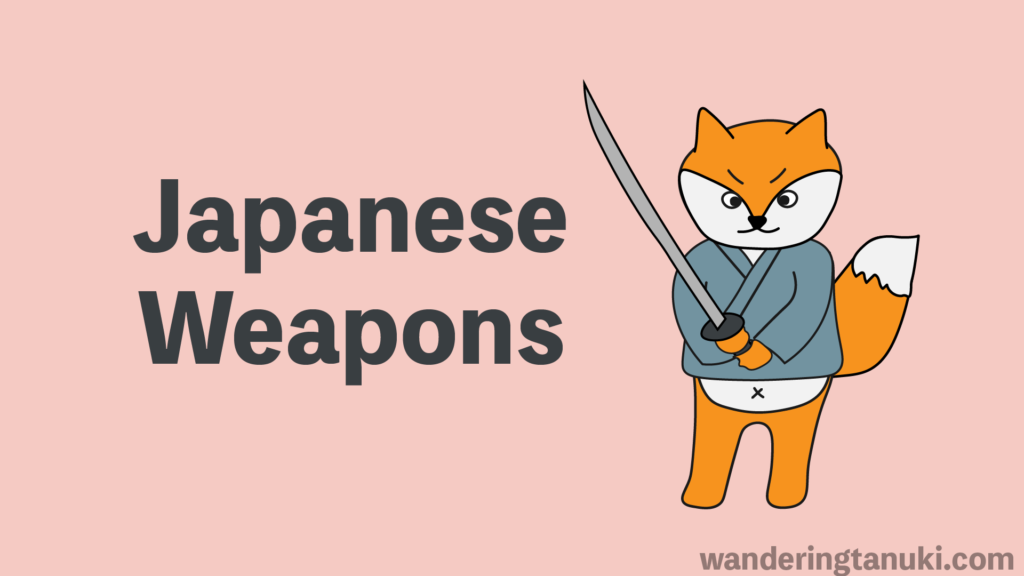
Japanese Swords:
Swords are one of the most famous Japanese weapons. They have been around since at least 1000B.C. and are an important part of the cultural history. In fact, Japanese swordsmiths were highly skilled and they produced well-balanced, strong, and sharp weapons. The blade of the sword is placed into categories depending on the year it was made.
Jōkotō – (Before 900 AD) These are the oldest swords found in Japan and featured both original Japanese designs and Chinese imported swords.
Kotō – (900-1596) In this time period, the Japanese swordsmiths developed their own unique style. This is when you’ll start to see the curved design that is an iconic part of Japanese swords. The blades during this time period were the highest quality. Even now, many swordsmiths try to emulate these blades.
Shintō – (1596-1780) During this time, there was more peace in Japan. This meant that there was less need for swords to be practical weapons. Instead, swords started to have elaborate lacquer handles, and carved designs on the blade.
Shinshintō – (1781 – 1876) Some of the criticism for shintō swords was the lack of durability and strength. There was a new movement to revive the sword making craft of the Kotō during this time.
Gendaitō – (1876 – present) From 1876, Japan entered an era of modernization. Swords and guns were not allowed on streets and swordsmiths lost their work. The police and military still used them up until WWII. However, the original craftsmanship of swordmaking was lost. In recent times, there has been a revival in sword making and recreations of old swords.
Types of Japanese swords:
Depending on the use, there were different types of swords. These had a wide range of shapes and lengths.
Katana

The most widely known Japanese sword is the katana. They have a single edged blade, so that only one side of the blade is sharp. In addition, there is a slight curve in the blade and it measures between 60-80cm long. The samurai used this sword during Japan’s feudal period.
Tachi

The tachi is older than the katana, and has a higher curvature blade. Swordsmiths created this sword so that it would work well for horseback. In fact, the curved blade made it easier to use while riding horses. Even after the development of the katana, high ranking samurai would still use this sword. The length of the blade is around 70-80cm and has a single edge blade.
Tsurugi
Japan developed the Tsurugi between the 5th to 9th century. They measured around 100 cm and had straight double-edged blades. It sometimes appears in Japanese mythology.
Wakizashi

The wakizashi are shorter swords used by samurai (30-60cm). Samurai wore them together with the katana. In addition, they used them during closer combat, beheading, and seppuku. They started being made around the 15th-16th century. Like the katana, they had slightly curved, single edged blades.
Ōdachi

These were heavy and long swords that could measure up to 377cm. Developed around the 14th century, these swords had curvature and a single edged blade. Although warriors sometimes used them in combat, they could also be offerings to the Shinto Gods
Tantō
The tantou were small swords that the Samurai used to stab from short distances. They came in a variety of different blade shapes from single to double bladed. The length was around 15-30 cm and was developed between the 8th to 12th centuries.
Pole and Spear Weapons:
Bō
This is a weapon that is associated with Okinawan martial arts. Okinawans used them for self defense. This is because there were bans on weapons in Okinawa in the 16th and 17th century. The local people had no way to defend themselves, and used poles made of wood.
Yari
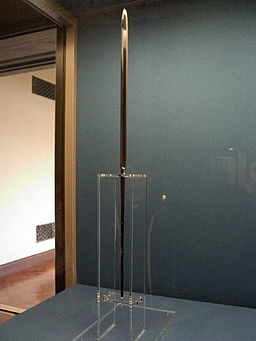
These were spears using the same material of blade as Japanese swords. They became popular around the 13-15th century when it was better to use long spears than swords. When used in a line formation with a large number of warriors, it was a great way to defend and attack.
Tsukubō
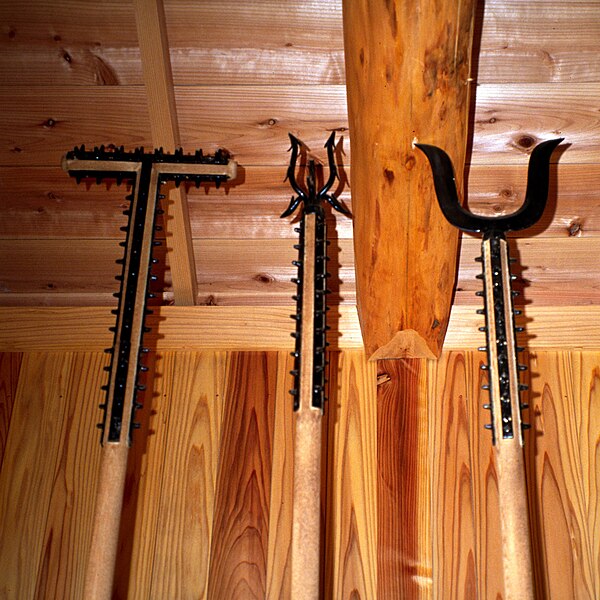
Samurai police officers used these poles with spikes during the Edo period. It was a way capture criminals without killing them.
Naginata

The samurai, as well as women warriors called onna-bugeisha used the naginata. They were long poles with a blade similar to a katana attached to the end. It was developed around the 12th century.
Small Japanese weapons:
Shuriken
If you’ve heard anything about a ninja, you might be familiar with the shuriken. These were small, star-shaped, sharp weapons meant to be thrown. They had holes in them to tie them together and make it easier to carry. Ninjas and samurai used these Japanese weapons to confuse the opponent and attack exposed body parts.
Kunai

These were originally a gardening tool, but it became a useful weapon in close combat. Kunai consists of unsharpened iron, and it useful for hitting and stabbing. The small size of the weapon was particularly useful for ninja who needed a high level of stealth.
Kusarigama
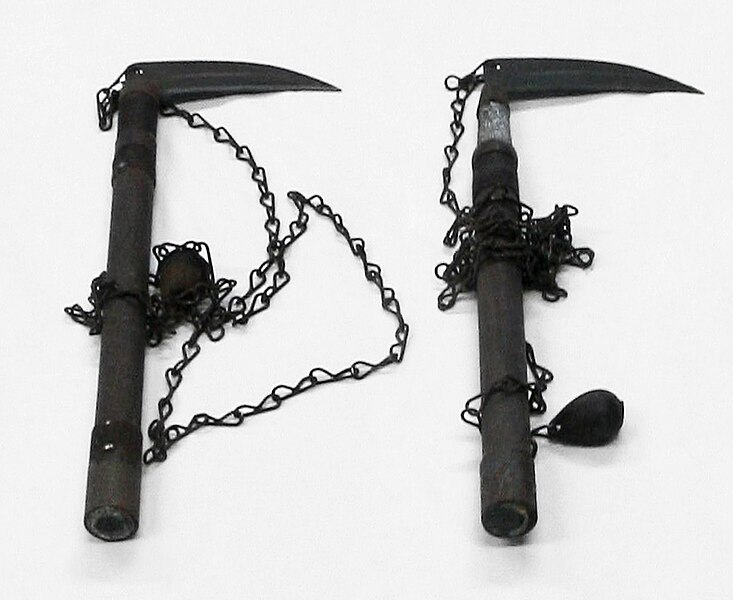
This weapon was a sickle attached to a chain. It was used by swinging the chain around. Unfortunately, it wasn’t practical on a battlefield because you could hit your own allies. Instead, you could use it to defend yourself against swords. The user would use the chain to wrap it around the sword, and then attack with the sickle.
Nunchaku

A nunchaku is a weapon with two sticks attached to each other by a chain or rope. Okinawa martial arts uses this weapon. These days, they are also popular for visual martial arts performances.
Makibishi

Makibishi is a useful Japanese weapon when planted into the ground. They were metal objects that were spiky and could pierce the soles of the intruder’s shoes. It was an effective defence weapon.
Kabutowari

This weapon literally translates to “helmet breaker”, and it is a knife that often comes with a hook near the handle. Samurai used it to take off the opponent’s armor or hook someone’s sword to disarm them. The knife measures around 35 – 40cm.
Japanese Firearms
Murata Rifle

The Japanese mostly imported firearms until 1880, when they created the Murata rifle. Its’ design was similar to the Gras rifle. The Japanese used Murata rifles during WWI.
Arisaka rifle
After the Murata rifle, the Japanese developed the Arisaka. These were stronger than the U.S., British, and German rifles that were around at the same time. Japan used Arisaka rifles during WWII.
Japanese Bows and Arrows
Yumi
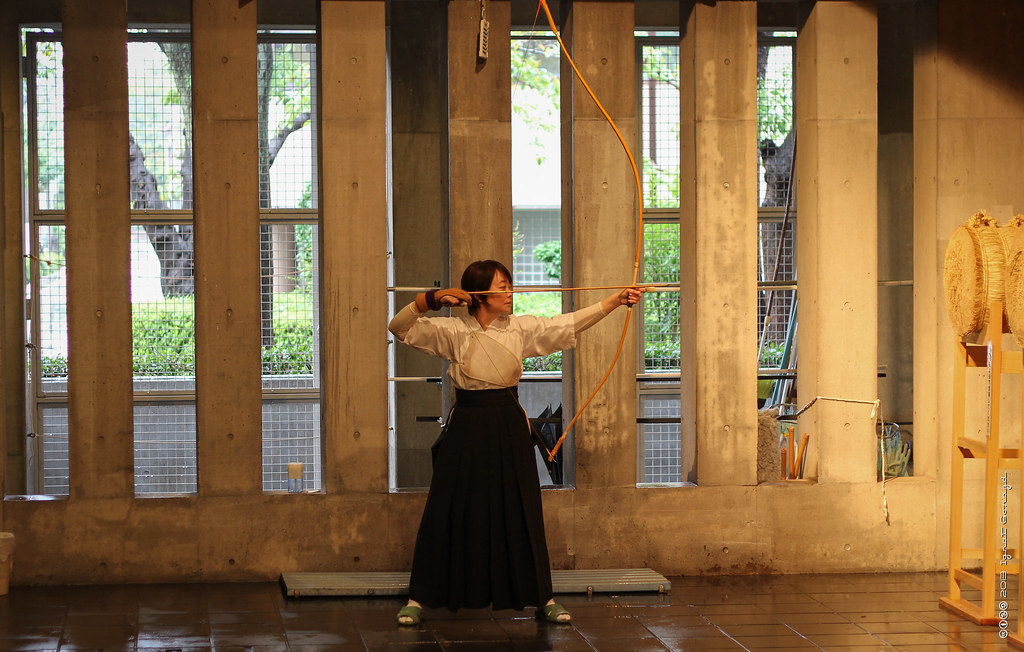
The traditional Japanese bow features an asymmetrical design and bamboo materials. The hand position is considerably lower than the upper part of the bow. The size of the bow can often be taller than the person using the bow. They were a popular weapon for samurai. In modern times, Kyuudo, a Japanese martial art for archery, uses the yumi.
Bō-hiya fire arrow
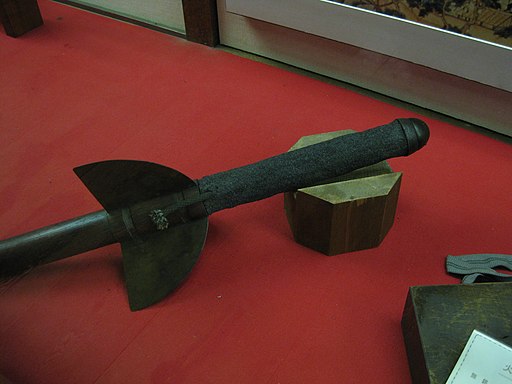
Yumi, the Japanese bow, was first used to launch the fire arrows. However, after the Japanese began using matchlock technology, they started launching them using a gun-like mechanism. They were useful for attacking ships in the 16th century.
I hope that this article on Japanese weapons showed you a unique side of Japanese cultural history! There are so many unique weapons and the craftsmanship is incredible. If you’re interested in reading more Japanese culture blog content be sure to check out my articles like How to enjoy Japanese onsen (hot springs) or Religion in Japan: Shinto and Buddhism
~ Tanuki






